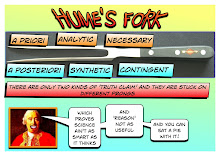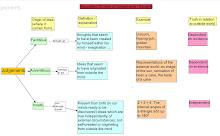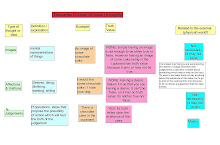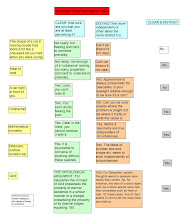This is a response to Hume who had denied such a possibility. 'Hume's fork' (see previous entry) made a strict separation between synthetic propositions, which for him could only be known 'a posteriori' and 'analytic' propositions which could be known a priori, but told us nothing about the world that was not already contained in their terms.
To understand this we have to look at the way the sentences we use to make propositions and claims about the world work. Sentences consist of subjects (the thing the sentence is about) and predicates (the words that say something about the subject). So, the sentence ‘Some frogs are green’ has ‘Some frogs’ as its subject and ‘are green’ as its predicate.
Both Kant and Hume thought that 'analytic' statements are those in which the subject contains the predicate and consequently they don't add any information about the world: an example of this would be the sentence ‘green frogs are green’, or to push it a little further, 'kangaroos are animals', because we could claim that the concept of 'kangaroo' contains the concept of 'animal', so if we already have the concept of 'kangaroo' we already have the concept of 'animal' and we know this independent of (further) experience', we know it 'a priori'.
On the other hand the predicates of 'synthetic' statements are not contained in the subject, so they do give us additional information about the world; for example ‘This frog is green’ or 'this kangaroo has a stamp collection.'
But Kant thought that statements like '7 + 5 = 12' were both 'synthetic' and 'a priori', in fact he thought that 'Mathematical judgments are all, without exception, synthetic.' For Kant, there is nothing contained in the concept of '7' and '5' that makes the knowledge that that adding them together will result in '12' immediately obvious or unavoidable. What he was getting at is perhaps easier to see if we consider larger numbers like for example, 38976 and 45204; their sum 84180 certainly does leap out at me, but I'm v. poor at maths. I think this gives an inkling of what Kant meant, but an awful lot of reading is really required to work your way into his idea.
Kant also thought that science could come up with synthetic a priori statements. He claimed that the statement, 'In all changes in the physical world the quantity of matter remains unchanged.' was such an example; he said;
Now, in thinking the concept of matter I do not think its permanence but only its presence in the space that it fills. Thinking that matter is permanent isn’t like thinking that women are female, or that tigers are animals. In judging that matter is permanent, therefore, I go beyond the concept of matter in order to add to it something that I didn’t think in it. So the proposition isn’t analytic but synthetic; yet it is thought a priori.
He also claimed that the statement, 'When one body collides with another, action and reaction must always be equal' was synthetic and a priori.
Again it is not obvious (not to most mortals anyway) exactly what he meant, but if we consider his ideas about the 'categories': how we experience the world in the way we do because time, space and cause and effect are built in to the way our minds are set up to experience the world, then we begin to see how we might know 'a priori' the stuff above about action and reaction, and such 'knowledge' certainly seems to add to our information about the world and is therefore 'synthetic'. Hume, of course denied that ideas about cause and effect, action and reaction etc. were anything other than the product of experience and as such, although synthetic, could only be known 'a posteriori'.
So, I hope that's clear, now. Another Saturday afternoon bites the dust of metaphysical speculation. And I haven't marked your essays yet!




















.jpg)







No comments:
Post a Comment